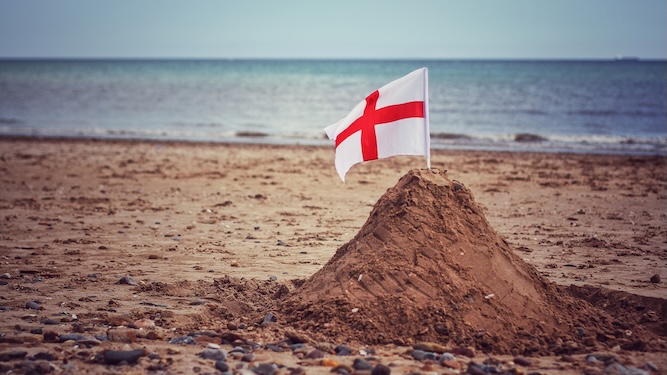Lifestyle
England Flags Spark Controversy This Summer: A Cultural Debate

The use of St George’s flags across England has ignited a cultural debate this summer, even in the absence of major football tournaments. Dubbed “Operation Raise The Colours,” this movement has been characterized by some as a display of patriotism, while critics argue it raises concerns about nationalism and racism.
Patriotism or Provocation?
Supporters of the flag display assert that it is a celebration of national pride. Yet, detractors claim this sentiment is overshadowed by associations with far-right groups. According to reports, some individuals participating in this movement have been accused of disingenuously framing their actions as patriotic. Critics point out that this rhetoric may be aimed at discrediting local authorities and businesses who remove flags from public spaces.
The leader of the Labour Party, Keir Starmer, has found himself embroiled in this controversy after inadvertently supporting the campaign. His endorsement has been characterized as a misstep by some who believe it aligns him with a divisive narrative.
Historical Context and Modern Usage
The St George’s flag has a complex history. St George, a figure often celebrated in England, was of Turkish descent and never set foot in the country. The flag itself was introduced to England by Richard the Lionheart, a French king who utilized it during the Crusades. Critics argue that the flag’s popularity has surged only in recent decades, making it a contemporary symbol rather than a historical one.
The manner in which the flags are displayed has also drawn negative attention. Some participants have opted to put up the flags in a manner that resembles scenes from films depicting football hooliganism, reinforcing negative stereotypes. Critics suggest that this approach undermines the potential for a constructive dialogue about national identity.
Local Regulations and Political Implications
Local councils have faced challenges in managing the public display of flags. Many areas have regulations governing such displays, and when flags are taken down, it is often for reasons related to public safety or aesthetics. Critics have expressed frustration, framing these actions as part of a broader trend of “woke” governance, while officials stress the need for regulations to prevent flag displays from becoming litter.
Political implications are also at play. Some politicians have attempted to leverage the flag’s popularity for electoral gain. The Labour Party, for instance, has been criticized for its perceived alignment with the campaign, potentially alienating traditional voters. This strategy highlights the complexities of national symbols in political discourse.
As discussions continue, the use of St George’s flags will likely remain a contentious topic. The intersection of national pride, historical context, and modern-day interpretations is shaping a debate that transcends mere symbolism, touching on deeper societal issues within England today.
-

 Health3 months ago
Health3 months agoNeurologist Warns Excessive Use of Supplements Can Harm Brain
-

 Health4 months ago
Health4 months agoFiona Phillips’ Husband Shares Heartfelt Update on Her Alzheimer’s Journey
-

 Science2 months ago
Science2 months agoBrian Cox Addresses Claims of Alien Probe in 3I/ATLAS Discovery
-

 Science2 months ago
Science2 months agoNASA Investigates Unusual Comet 3I/ATLAS; New Findings Emerge
-

 Science2 months ago
Science2 months agoScientists Examine 3I/ATLAS: Alien Artifact or Cosmic Oddity?
-

 Entertainment2 months ago
Entertainment2 months agoLewis Cope Addresses Accusations of Dance Training Advantage
-

 Entertainment5 months ago
Entertainment5 months agoKerry Katona Discusses Future Baby Plans and Brian McFadden’s Wedding
-

 Science2 months ago
Science2 months agoNASA Investigates Speedy Object 3I/ATLAS, Sparking Speculation
-

 Entertainment5 months ago
Entertainment5 months agoEmmerdale Faces Tension as Dylan and April’s Lives Hang in the Balance
-

 World3 months ago
World3 months agoCole Palmer’s Cryptic Message to Kobbie Mainoo Following Loan Talks
-

 World4 weeks ago
World4 weeks agoBailey and Rebecca Announce Heartbreaking Split After MAFS Reunion
-

 Science2 months ago
Science2 months agoNASA Scientists Explore Origins of 3I/ATLAS, a Fast-Moving Visitor









